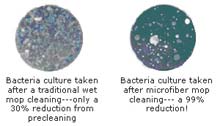The Most Lethal Superbug Epidemic Ever is Spreading Like Wildfire: Infectious MRSA Bacteria
by www.SixWise.com
Americans visit their doctors about 12 million times each year because of concerns they’ve contracted a “Methicillin-resistant Staphylococcus Aureus”, more commonly known as “MRSA”, infection.
|

As Many as 1 in 3 People are "Colonized" MRSA Carriers
Once confined to hospitals, MRSA infections are now spreading rapidly among health clubs, schools and other community facilties.
Health Club Members, School children to professional sports athletes have gotten MRSA which is why YOU and your loved one’s too are highly susceptible.
MRSA is spreading from the locker-rooms to the playgrounds of all ages! |
MRSA cases in the United States, once confined to those in hospitals and other health care settings, have spread to the general community, where outbreaks have been reported among schools, health clubs and other public facilities. In fact, a study in the journal Emerging Infectious Diseases found a seven-fold increase in community-associated MRSA strains in outpatient hospital units between 1999 and 2006.
Already, MRSA kills up to 20,000 Americans each year -- which is a greater death toll than AIDS, which took just over 14, 500 lives in 2007.
"MRSA has generally been a significant problem only in hospitals," Eili Klein, the study’s lead author, told Science Daily. "But the findings from this study suggest that there is a significant reservoir in the community as well."
Is This Lethal Superbug in Your Neighborhood?
MRSA is called a superbug because it's resistant to many and may soon be resistant to nearly all antibiotics, making it extremely difficult to treat. Not only is MRSA resistant to methicillin, which includes penicillin and related antibiotics, but it's beginning to become resistant to newer antibiotics as well.
For instance, one particularly lethal strain of MRSA, USA600, which causes bloodstream infections and is five times more lethal than other strains, is now showing some resistance to vancomycin, a powerful antibiotic that is used to treat MRSA.
"Colonized": Who Are the MRSA Carriers (1 in 3 Odds Includes You)
While it's not uncommon for people to carry MRSA on their skin -- about 30 percent of people do -- the bacteria has become problematic because of the overuse of antibiotics in the United States, in both human use and the routine feeding of antibiotics to livestock, which you then ingest via your food and water. This has caused the bacteria to mutate into one that is a challenge to control.
If you carry MRSA on your skin without being sick (which happens regularly), you are said to be "colonized" with the bacteria. Though you may not be affected, you can pass the germs on to others. MRSA can spread rapidly from person-to-person, especially among groups that may share clothing, sports equipment, or towels, or who do not wash their hands often (such as children).
Recently, MRSA outbreaks have sprung up among elementary schools, sports teams, dance companies and health clubs.
Signs and Symptoms of MRSA
MRSA typically begins as a skin rash that resembles small pimples, boils or spider bites. The bumps then progress into deep abscesses that may require surgical draining. If the infection spreads beyond the skin, it can lead to infections in your bones, joints, bloodstream, heart and lungs.
If you or your children have a skin wound that appears infected (warm, red or tender to touch, swelling, high fever), you should see your doctor right away. Request to have the wound tested for MRSA before starting any antibiotic therapy, as only certain antibiotics are effective against MRSA.
Who is Most at Risk?
Certain factors can increase your risk of infection, including:
|
PerfectClean Cloths: Don't Leave Home Without Them

PerfectClean hand wipes have primarily been sold and used commercially in hospitals due to their patented Antimicrobial Microfiber quality. They are an essential tool for keeping germs at bay without use of toxic cleaners that may strengthen the MRSA resistances.
The cloths are made with a revolutionary ultramicrofiber construction that enables them to reach deep into microscopic crevices (NO other cleaning tool available even comes close!) to actually remove dirt and bacteria, not just push it around like ordinary cleaning rags.
Plus, these cloths are small enough to slip into your pocket, purse, or desk drawer, and you can use them without any cleaning products or water. Simply pull out the cloth, wipe off your hands, and enjoy the peace of mind in knowing you’re taking an incredibly effective step to keeping germs away.
|
How to Stop MRSA in its Tracks
MRSA is incredibly difficult to treat … but preventing it is simple. The most effective measure you can take to reduce your risk of this deadly infection involves simple hygiene, and particularly hand-washing with soap and water.
One study by researchers from University College Hospital, London, found that hand-washing was even more important than keeping patients in single rooms or special MRSA wards in preventing the spread of MRSA infection.
So it turns out mom's advice to wash your hands with soap was right all along. In fact, hand washing with soap and water has been proven to be the best way to get disease-causing viruses off of your hands.
But there are a couple of problems with hand-washing that must be addressed. First, if you wash your hands too often, you may actually dry out and damage your skin – and your skin is actually the best defense against invading viruses. If your dry hands crack or have other tiny abrasions from excessive hand-washing, it will allow an entry point for viruses.
Second, hand-washing is not always convenient or possible. For instance, if you shake hands with a colleague or go grocery shopping, it’s not possible to wash your hands right away and you may end up touching your eyes, nose or mouth before you do, providing another entryway for viruses.
Hand sanitizers, though convenient and portable, are also potentially problematic. There is some concern that these antibacterial liquids may limit children’s exposure to germs, to the point their immune systems are negatively impacted.
Further, hand sanitizers, including one of the leading brands, Purell, have been given a seven out of 10 score for toxicity (with 10 being the highest hazard) by the Environmental Working Group’s Skin Deep Cosmetic Safety Database. According to Skin Deep, ingredients in Purell Hand Sanitizer are linked to cancer, endocrine disruption, allergies, reproductive toxicity and more.
So the best alternative to soap and water -- ideal for use when you can’t get to a sink or have been washing your hands to the point they are getting dry and cracked -- are PerfectClean Antimicrobial Microfiber hand wipes (used nationwide in Hospitals).
These wipes are used by hospitals, schools and other commercial organizations that require ultra-clean environments. PerfectClean's ultramicrofiber construction combined with a patented antimicrobial chemistry enables these clothes to reach deep into microscopic crevices of all surfaces, including your hands, to remove pathogens in their path... that is because at an astonishing 3 microns, the ultramicrofibers are even smaller than most bacteria (each cleaning cloth contains over 300 miles of actual cleaning surface!).
PerfectClean products are completely safe, reducing or even eliminating the need for harsh soaps and toxic cleaners. You can use the hand wipes dry or dampened only with water for the most effective clean.
In fact, we recommend carrying a PerfectClean Antimicrobial Microfiber hand wipe in your pocket and wiping your hand discreetly any time you shake hands or touch a public surface (especially door knobs, shopping cart handles, light switches and other heavily contaminated but rarely cleaned surfaces). Because MRSA has also been spreading around schools, we recommend you tuck one in your child’s backpack and teach him or her to wipe his hands regularly throughout the day.
How to Use Hospital-Grade Microfiber Hand Wipes
-
Use these wipes to clean anywhere others touch: on your desktop, telephone, keyboard, door knobs & door frames, chair-arms/back, mirror surfaces, file cabinets, other office furniture and other large surfaces. Can be used dry or lightly dampened.
And because PerfectClean Antimicrobial Microfiber hand wipes are made of highly durable ultramicrofiber cloth, you can use them for 100+ washes before you need to replace them -- making PerfectClean Hand Wipes incredibly economical for everyday use.
|

Kids share everything – including bacteria --- which is why it’s so important to teach your child the importance of regular hand-washing and sanitizing with a PerfectClean Hand Wipe.
|
Remember, MRSA spreads from skin-to-skin contact, and also via personal items, so using the following common-sense tips will also help protect you and your family from MRSA. Be sure to share these tips with your school-aged children and teens, as they're often the ones who are inclined to share items they shouldn't.
Another Key to Avoiding MRSA …
The key to fighting off illness within your body (this includes not only bacterial infections like MRSA but viruses too) is to balance the good and bad bacteria in your gut. Why? Because 70 percent of your immune system is located in your digestive system. This means that if your gut is overrun with bad bacteria, there’s a good chance your immune system will not be functioning at its best.
Your gut bacteria will be negatively influenced by antibiotics, which kill off both good and bad bacteria. This is why recent antibiotic use is a risk factor for MRSA. To cut down on your exposure, only take antibiotics when they’re absolutely necessary, and purchase organic meat and dairy products (which are antibiotic-free).
You can also help fortify your gut and immune system health with AbsorbAid Probiotic from NutritionsFinest.com -- a superlative probiotic supplement that provides clinical activities supporting systemic health and wellness through immune-system protection, allergy reduction and effective and enhanced nutrient absorption.
AbsorbAid Probiotic has 30 billion organisms per capsule, with two clinically effective and dominant genera Bifidobacterium and Lactobacillus: L. acidophilus and L. salivarius in a 2:1 ratio and B. lactis and B. breve, also in a 2:1 ratio. Each bacterial genus-species has its own specific metabolic activities, which lead to their effective inter-species synergism.
Studies have shown that probiotics may be helpful with both immune system modulation and allergies, plus they’re imperative if you’ve recently been on antibiotic therapy. It’s a simple step that may help keep you and your family in the best health possible.
Cultured foods, things like kefir (a fermented milk drink that tastes like tart yogurt) and traditionally fermented sauerkraut, natto and other fermented vegetables are also among the best sources of probiotics around. So in addition to taking a high-quality probiotic, adding these probiotic-rich foods to your diet is also important.
Eating plenty of fruits and veggies, in a wide range of colors, gives your body immune-boosting phytochemicals as well, so be sure you’re eating a healthy, fresh, veggie-rich diet. For some unique and delicious recipe ideas using only the freshest, healthiest ingredients, check out the cookbook “Alive in 5:” Raw Gourmet Meals in Minute!
Since you can’t see MRSA, you can probably not avoid it entirely. This is why boosting your immune system with healthy lifestyle strategies is so important. Good hygiene will greatly reduce your risk of transferring MRSA into your body, but in the event the bacteria does get in, it’s your immune system that will keep you safe.
You can find more healthy lifestyle strategies to keep your immune system health at its peak here.
Recommended Reading
The Rise of Contagious Disease & How to Minimize Your Risk of Contagious Disease Exposure
American Medical Association Considers Banning Doctors’ White Coats
Sources
Emerging Infectious Diseases Volume 15, Number 12–December 2009
Science Daily November 9, 2009
Science Daily November 3, 2009
Science Daily March 31, 2009
MayoClinic.com